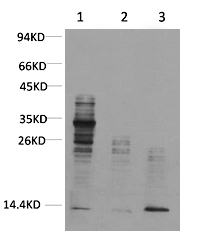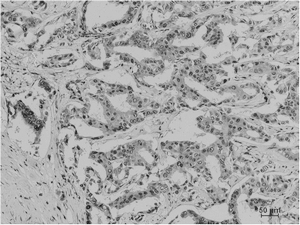

| WB | 咨询技术 | Human,Mouse,Rat |
| IF | 咨询技术 | Human,Mouse,Rat |
| IHC | 1/200-500 | Human,Mouse,Rat |
| ICC | 技术咨询 | Human,Mouse,Rat |
| FCM | 咨询技术 | Human,Mouse,Rat |
| Elisa | 咨询技术 | Human,Mouse,Rat |
| Antibody Type | Primary antibody |
| Storage | Store at 4°C short term. Aliquot and store at -20°C long term. Avoid freeze/thaw cycles. |
| Immunogen | Purified Protein |
| Formulation | Purified antibody in PBS with 0.05% sodium azide and 50% glycerol. |
+ +
以下是3-4篇关于Acetyl Lysine抗体的代表性文献及其摘要内容:
---
1. **文献名称**: *Lysine Acetylation Targets Protein Complexes and Co-Regulates Major Cellular Functions*
**作者**: Choudhary, C. et al.
**摘要**: 该研究通过基于Acetyl Lysine抗体的亲和纯化结合质谱技术,系统鉴定了超过2000个人类细胞中的乙酰化位点,揭示了赖氨酸乙酰化在代谢调控、染色质动态和细胞周期中的广泛作用。
2. **文献名称**: *Substrate and Functional Diversity of Lysine Acetylation Revealed by a Proteomics Survey*
**作者**: Kim, S.C. et al.
**摘要**: 利用Acetyl Lysine特异性抗体进行免疫沉淀,结合高通量质谱分析,鉴定出超过300种哺乳动物蛋白的乙酰化修饰,表明乙酰化在多种细胞通路(如转录调控和RNA代谢)中的关键功能。
3. **文献名称**: *Immunoaffinity Enrichment of Acetylated Lysine Peptides for Mass Spectrometry Analysis*
**作者**: Tanner, S. et al.
**摘要**: 提出了一种基于Acetyl Lysine抗体的肽段富集方法,显著提高了质谱检测乙酰化修饰的灵敏度和覆盖度,为表观遗传修饰研究提供了重要技术支撑。
4. **文献名称**: *The Landscape of Acetylation in Classical Histones and Beyond*
**作者**: Bheda, P. et al.
**摘要**: 综述了Acetyl Lysine抗体在组蛋白和非组蛋白乙酰化研究中的应用,强调其在解析疾病(如癌症和神经退行性疾病)相关分子机制中的关键作用。
---
这些文献覆盖了Acetyl Lysine抗体在基础研究和技术开发中的核心应用,涉及蛋白质组学、表观遗传学和疾病机制等领域。
Acetyl lysine antibodies are essential tools in studying post-translational modifications (PTMs), particularly lysine acetylation, which plays a critical role in regulating protein function and cellular processes. These antibodies specifically recognize the acetylated ε-amino group of lysine residues (Kac), a reversible modification catalyzed by histone acetyltransferases (HATs) and deacetylases (HDACs/sirtuins). Initially developed to investigate histone acetylation in epigenetics, they have since expanded to study non-histone proteins, revealing acetylation’s broader impact on transcription, metabolism, DNA repair, and signal transduction.
Acetyl lysine antibodies are widely used in techniques like Western blotting, immunoprecipitation, and immunofluorescence to detect acetylation patterns in proteins such as histones (e.g., H3K9ac, H3K27ac), tumor suppressors (e.g., p53), and cytoskeletal components (e.g., α-tubulin). Their development addressed the need to map acetylation sites and understand their dynamic regulation in health and disease. Dysregulated acetylation is linked to cancer, neurodegenerative disorders, and metabolic syndromes, making these antibodies vital for both basic research and drug discovery targeting acetylation-related pathways.
Available as monoclonal or polyclonal formats, these antibodies require rigorous validation to ensure specificity, as cross-reactivity with other acylations (e.g., succinylation) can occur. Advances in pan-specific acetyl lysine antibodies have enabled broad profiling of acetylome changes, while site-specific variants allow precise mechanistic studies. Their application continues to uncover novel roles of acetylation in cellular adaptation, stress responses, and disease pathogenesis.
×